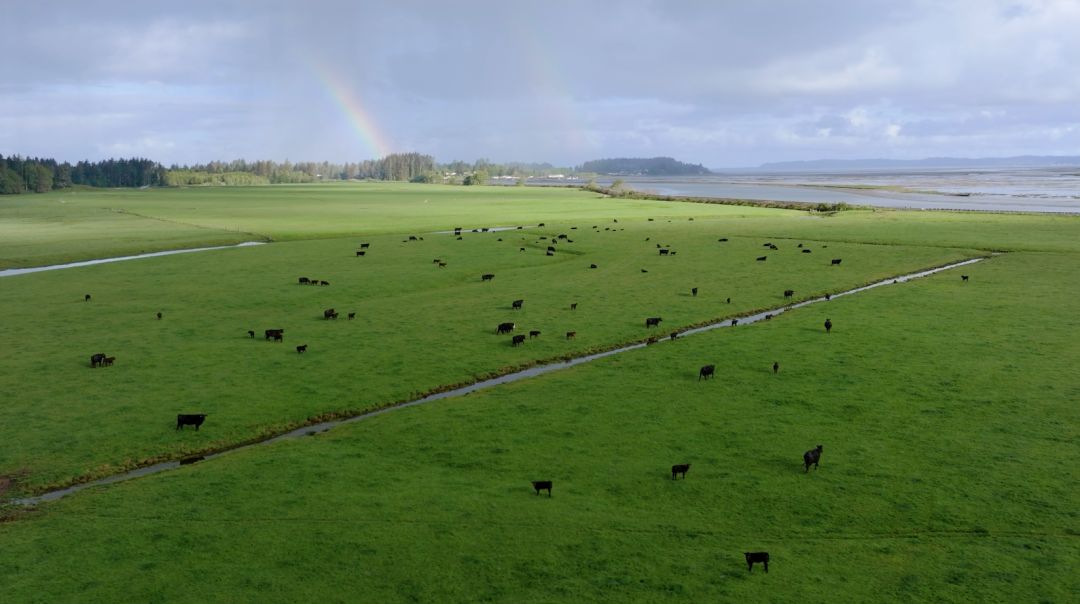A Century of Surf & Turf
The classic pairing of a juicy steak and fresh seafood goes deeper than the menu staple for many Seattle restaurants. Many diners enjoying the savory and briny combo of a locally grown steak and succulent oysters would not think that raising the two delicacies side by side provides the opportunity for ranchers and fishermen to share resources. For the Rose Family of South Bend, Washington, the oyster beds that lay as neighbor to their cattle pastures are the perfect partners in raising high quality beef and fresh oysters for their local customers.
For more than a century the Rose family has tended to their cattle and cared for their pasture lands that are nestled along the south bend of the Willapa River in one of the rainiest spots in Washington. For the Roses, water is both a precious resource to be protected and essential tool used in raising their beef cattle and managing their timber lands. Since 1923, each generation of the Rose family has called this land home, playing their part in producing high-quality beef, improving the land and maintaining the family legacy.

“We want our grass to be green, our cows to be healthy and our water to be clean,” Jim Rose said. “We care about our cows and we care about the ground that they’re on.”
Sustainability At Work
For the Rose family, stewardship of the land and water are the highest priority. They aim to sustain their family’s 100 year traditions while also innovating to support their family ranch, the neighboring farms and their local community. Nestled between dense forest and the Willapa Bay south bend is one of the wettest regions of western Washington, with rainfall that is more than double what falls in Seattle.
That means the Roses manage that water with as much care as they manage their cattle. They do this through maintaining healthy pastures for their cattle to graze, rotating their cattle through pastures to distribute the pressure on the soils from both cattle and the rainfall. This results in the healthiest grass, which makes everyone happy, especially their herd of Angus cattle.
"To be sustainable you've got to take care of the ground. And you've got to take care of the cows," said Jim Rose. "Sustainability is more than a buzzword or a label on a package, for us it’s a daily effort to find balance and opportunity."

A critical practice for maintaining healthy soils and pastures at Rose Ranch is in how they protect the soil from the water itself. Water, especially the volume of rainfall common to South Bend, can erode the land. But the Roses thoughtfully protect their pastures by shaping drainage zones and reinforcing the land with discarded oyster shells from their neighboring oyster farmers. The oyster shells can be crushed up and laid down to help hold the soil in place, create trails for the cattle to walk on and roads for their vehicles to drive on, as well as spread across wetter areas to reduce the potential for mud or standing water. The crushed oyster shells also double as a natural fertilizer by delivering calcium to the soil which benefits the overall health and nutrition of the grass.
In return for those oyster shells, the Rose Ranch supports the local shellfish growers by providing them with timber they thin from the ranch’s property, these long whips are used to mark where the oyster beds are planted. The oystermen use these markers to outline the beds, and manage the growth and harvesting of their regionally renowned Willapa Bay Oysters.
Just as Rose Ranch embodies the best of sustainable cattle ranching practices, the Rose family plays a strong role in supporting a tight-knit, diverse local community of loggers, fishermen, oyster growers and small businesses. Jim is an active member of the Farm Forestry Association, South Bend School Board, local volunteer fire department, and the Conservation District.

“We are invested in this community. I think we can be leaders by setting the example. We share our knowledge and help protect what we consider everyone’s resources. We’re always adapting and changing, learning about new practices to build on sustainability,” Jim said.
Jim shared, “We believe in being good neighbors. Donating our time and equipment is what makes this awesome community feel like a big family. The area has changed a lot from when I was a boy, and it’s much more diverse today.”
The Tradition of Change
For over a century, each generation of the Roses has returned to South Bend to continue the legacy of raising high-quality cattle and caring for the water and land they live on, ensuring it will be in operation for another 100 years.
“I love what I do. I walk out in the morning and never know what I’m going to see. When you’re working in nature, there’s the challenge of trying to make it all work together to meet your goals,” Jim said, “but we know sometimes nature has other plans, so we just keep adapting and changing.”
Just like Jim, his three sons — Sean, Drew and Brett — have all returned to the ranch and work the family’s business, and Jim said, “the biggest thing coming up is the transition to the next generation.”
After a century of family farming, the Roses know that including the next generation is critical to sustaining their legacy. For now that looks like Sean, Drew and Brett working with Jim and slowly buying the cattle herd and the property from him so that the Rose Ranch continues to be a viable and vibrant part of the South Bend community.

For more videos from the Rose Ranch and Rose family, and more information on how beef is raised and grown across Washington State, visit wabeef.org.
